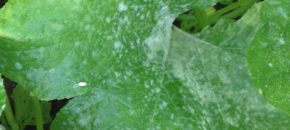Please follow the the link below the program agenda, to attend the Wine Grape Twilight – II meeting, scheduled on August 5 (Wed), 6 pm – 7:30 pm. There is no registration requirement for this meeting. Growers Questions and Discussions: My vineyard could be developing resistance to Downy Mildew (DM) spray. What should I do […]
Continue reading...Vegetable Disease Update – 8/1/20
No reports of Late blight in region. To track the progress of Late blight in the US please click here. Cucurbit downy mildew remains active on cucumber in southern New Jersey. There have been no reports of CDM in other cucurbit crops in the region to date. For a review of CDM control please click […]
Continue reading...Vegetable IPM Update 7/29/20

Sweet Corn European corn borer (ECB) adults continue to be very low, although a few traps in Cape May and Burlington counties have shown initial signs of a second flight. Numbers are low and isolated such that no map will appear in this edition. The highest nightly trap catches of ECB for the week ending […]
Continue reading...Fruit IPM for 7/29/20
Peach: Stink Bugs Apples and Peaches: Brown Marmorated Stink Bug (BMSB) has been steadily increasing in isolated locations. The highest levels seen are on 2 farms in Gloucester County at 4 per trap and at 2 farms in Morris County at 16 and 18 per trap. The Morris County traps are adjacent to apples, and […]
Continue reading...USDA Farmers To Families Food Box Program – New Round Solicitation

Listening in USDA’s webinar reveals major changes in this latest solicitation for the third round of the Farmers to Families Food Box Program. This time they only want multi-commodity ‘combination boxes’, i.e. produce plus meat/dairy plus optional eggs! — check out the specs on page 4 of the solicitation here – https://www.ams.usda.gov/sites/default/files/media/FFFB_solicitationRound3.pdf). They are much […]
Continue reading...Meet Cosmo, a bull calf designed to produce 75% male offspring
NEWS RELEASE 23-JUL-2020 (reposted from EurekAlert and AAAS) Scientists use CRISPR technology to insert sex-determining gene UNIVERSITY OF CALIFORNIA – DAVIS IMAGE: COSMO, A 110-POUND BULL CALF WAS BORN IN APRIL OF 2020 AT UC DAVIS. SCIENTISTS SUCCESSFULLY GENOME-EDITED HIM AS AN EMBRYO TO PRODUCE MORE MALE OFFSPRING. view more CREDIT: ALISON VAN EENENNAAM/UC DAVIS Scientists at the University […]
Continue reading...